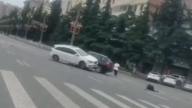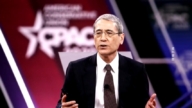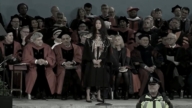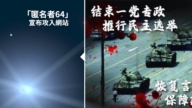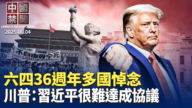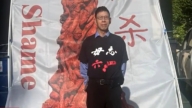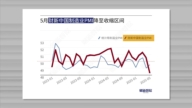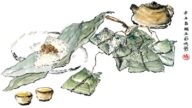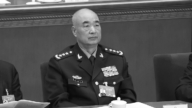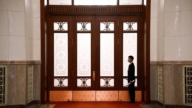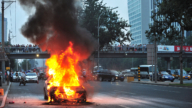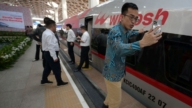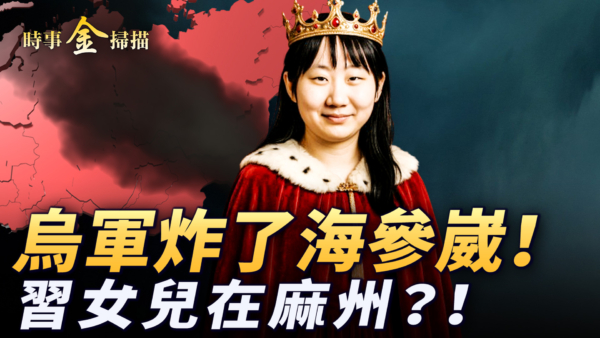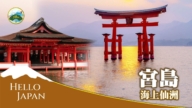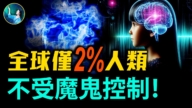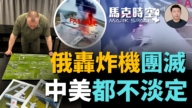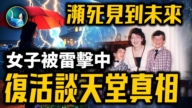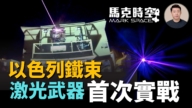【新唐人2012年4月5日讯】在中共中央前总书记胡耀邦逝世23年的时刻,4月3号,大陆媒体发出缅怀文章。文章写道:胡耀邦墓前像征着当时12亿民众的12个大石头无语簇拥﹔而胡耀邦的侧面雕像,任凭岁月风雨的洗礼,“凝眉忧思的面庞依然清晰”。 在中共十八大换届前夕,这篇“胡耀邦墓前清明祭”引发大陆政治体制改革走向的联想。胡耀邦智囊阮铭表示:中共体制内谈改革永远也改革不了。
中共前领导人胡耀邦,曾为文革中“冤假错案”的大批老干部和知识份子进行平反。1986年12月中旬开始的学生要求“民主选举和反贪腐”示威运动,促使胡耀邦下台。
1989年4月15号,胡耀邦突发心脏病逝世,北京学生举行缅怀胡耀邦活动,并提出改革诉求,最终引发了震惊中外的“天安门民主运动”。
《炎黄春秋》曾刊载胡耀邦政治秘书刘崇文的6000字长文—-《胡耀邦最后的日子》。文章披露了胡耀邦去世前的部分生活细节,其中说道:胡耀邦非常抑郁,他希望中共高层对“学潮”有一个正确的评价。他认为,民主浪潮是世界性的,谁也无法阻挡。
曾任职中宣部与中共中央党校的胡耀邦智囊—-阮铭向《新唐人》表示:中国要走民主的路,光靠中共体制内改革不可能成功。
阮铭:“ 只有邓小平他才是反对民主的。民主就是体制外,民主怎么是体制内呀?民主就是游行示威,有反对的自由,有言论自由。体制内就是封闭的。”
中共国务院总理温家宝2010年曾公开赞扬胡耀邦的贡献,被外界认为温家宝有意继承胡耀邦改革的遗志。今年人大和政协“两会”记者会上,温家宝强调进行政治体制改革的必要,并警惕大陆还有发生文革的危险。
《北京之春》杂志主编胡平表示:共产党体制,名义上它有宪法,它也承认有言论自由、结社自由,和各级官员选举等等,但是,它实际剥夺了这些自由,使宪法沦为一纸空文。
胡平:“ 人们要是坚持把宪法这些关于自由的条文切实兑现,它实际上本身就会导致整个制度的解体,所有现在的极权国家都有这么一个特点,它都要承认一切权力来自于人民,而我们知道共产党它从来不会把这些话兑现,它用别的东西把这些话压住。反过来一旦人民或它的领导者都来要求这些话兑现,那这个制度就转型了。不管是当年苏联的戈尔巴乔夫或者是东欧的国家,什么匈牙利领导人等,他们就是这么做的。就促成了这样的转型,促成了共产党组织本身的解体。”
中国问题研究专家赵远明认为,中国如果进行改革,第一步应该建立真正的多党制,互相监督制衡,而不是一党独大。
另外,时事评论员赵培认为,中共寡头政治的体制,所谓的政改也只是修修补补的状态,中共所谓的政改只是在延缓倒台的时间,不会带给中国真正的希望。
采访编辑/常春 后制/黎安安
=====================
China’s Media Commemorate Hu Yaobang
On 3rd April, China’s media reports commemorated the 23rd anniversary of Hu Yaobang’s death. Hu Yaobang was the former General Secretary of the Chinese Communist Party (CCP). “Condolences on Tomb-sweeping Day for Hu Yaobang”, the article provoked an association of the mainland’s political reform path ahead on the eve of the CCP’s leadership transition. Ruan Ming, the think-tank of Hu Yaobang, says that talk of reform will never succeed if being carried out from within the CCP system.
Former CCP leader Hu Yaobang rehabilitated a large number of CCP veteran cadres and intellectuals who had been persecuted during the cultural revolution.
A series of widespread student protests started in December 1986, demanding “democratic elections and anti-corruption”. The event triggered Hu Yaobang’s eventual resignation.
Hu Yaobang died from sudden cardiac arrest on 15th April, 1989. Beijing students held an activity to commemorate him, and called for reform. This led to the later global sensation of the Tiananmen Square Democracy Movement of 1989.
Magazine Yanhuang Chunqiu published a 6000-word article authored by Liu Chongwen, Hu Yaobang’s political secretary. The article, “Hu Yaobang’s Last Days", revealed some details of Hu’s life before his death. “Hu Yaobang was very depressed and hoped the central leadership could correctly assess the ‘student protest’. He believes that the democratic wave is a world trend, and
no one can stop it.”, said the article.
Ruan Ming, the former think-tank of Hu Yaobang, comments that China should choose to take the path of democracy. It is impossible to succeed by only relying on the reform carried-out from within the CCP system.
Ruan Ming: “Only Deng Xiaoping himself opposed democracy. Democracy is outside the CCP system, how can it exist within the CCP system? To be exact, democracy allows for demonstration, the freedom to express opposition and the freedom of speech. All these are blocked off inside (the CCP) system."
In 2010, the CCP Premier Wen Jiabao publicly praised the contribution that Hu Yaobang had made. Wen’s talk was deemed as his intention to inherit the unfulfilled wish of Hu Yaobang, said outside comments. At the press conference for this year’s “two sessions", Wen Jiabao emphasized the need for political reform. Wen also warned that China was in danger of experiencing a recurrence of the cultural revolution.
According to Hu Ping, chief editor of “Beijing Spring" magazine, the communist system has its nominal constitution and outwardly recognizes the freedom of speech, freedom of association, election of officers at all levels, and so on.
While in practice, it deprives of these freedoms, invalidating the constitution to a scrap of paper.
Hu Ping: “If the people insist on fulfilling these provisions of freedom that are stipulated in the constitution, the fulfilling itself would lead to the disintegration of the entire (CCP) system. All existing totalitarian regimes share such a common feature that they admit all the power comes from the people themselves. But as we know the CCP has never fulfilled these promises. It used other things to press against it and hold them off. But once the people or even the regime’s leaders all want to put these words into practice, the system will be transformed. Like Gorbachev of the former Soviet Union or Eastern Bloc or the Hungarian leaders, they all did so. That contributed to the transformation, and to the disintegration of the Communist Party itself.”
Expert in China issues, Zhao Yuanming, comments on how to carry out China’s reform. The first step should be to set up a genuine multi-party system so as to form a system of mutual checks and balances. This will avoid one-party dominance, says Zhao.
According to political commentator Zhao Pei, the CCP oligarchic political system claiming to carry out political reform is just tinkering with the system. Zhao Pei points out that carrying out so-called political reform is just postponing the CCP’s downfall. It will not bring any real hope to China, he says.



